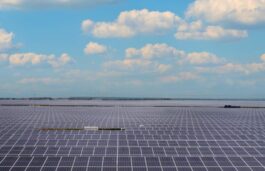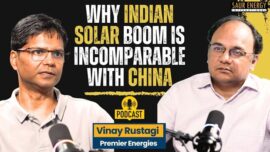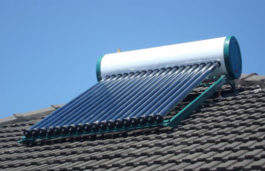Highlights :
- The drop in imports is driven equally by better domestic availability and lower capacity additions.
- Manufacturing Capacity is undergoing the highest jump ever seen, thanks to a slew of incentives as well as high protective barriers coming up next April.

Yesterday, the Union Power and New and Renewable Energy Minister Raj Kumar Singh while addressing the Lok Sabha announced that India’s solar cells and modules imports fell to $571.65 million in the last financial year (FY20-21) from $2.16 billion and $1.68 billion in FY18-19 and FY19-20, respectively.
Till July end, India had imposed tariff and non-tariff barriers such as a safeguard duty on solar cells and modules imported from China and Malaysia, for promoting domestic manufacturing. China alone accounted for $494.87 million of $571.65 million worth of solar cells and module imports by India in 2020-21. Followed by Thailand that accounted for $18.76 million worth of Solar PV cells/ modules imported, followed by Vietnam ($14.97 million) and Taiwan ($11.28 million).
The government has been trying to protect domestic production and ramp up domestic manufacturing through various steps, including imposing Basic Customs Duty from 2022. But, till recently, India’s domestic manufacturing capacity is not enough to fulfill the solar target of 280 GW by 2030. India’s cell-making capacity is a little over 3 GW a year. The module production capacity in the country is around five times that of solar cells, yet it mostly depends upon China for solar cells and modules imports. However, that seems set to change fast, as Singh explained.
Singh replied to a question asked in the house saying, steps taken to promote domestic manufacturing of solar PV cells and modules include a modified special incentive package scheme (M-SIPS), Production Linked Incentive (PLI) Scheme. The Scheme has provisions for supporting the setting up of integrated manufacturing units of high-efficiency solar PV modules by providing Production Linked Incentive (PLI) on sales of such solar PV modules. The scheme was approved with a financial outlay of Rs. 4500-crore for five years.
For the solar energy sector, on 07.04.2021, the Cabinet approved a Production Linked Incentive (PLI) Scheme, namely, ‘National Programme on High-Efficiency Solar PV Modules’, with an outlay of Rs. 4,500 crore. Though on the same date, the Cabinet also approved another Production Linked Incentive (PLI) Scheme for White Goods (Air Conditioners and LED Lights), with an outlay of Rs. 6,238 crore, the same is not intended for the solar energy sector. (b): Solar PV cells and modules are already being manufactured in the country. To further enhance domestic manufacturing of solar PV cells and modules, the Government has taken the following steps:
- Modified Special Incentive Package Scheme (M-SIPS) Scheme of Ministry of Electronics & Information Technology: The scheme mainly provides a subsidy for capital expenditure – 20% for investments in Special Economic Zones (SEZs) and 25% in non-SEZs. The Scheme was open to receive applications till 31st December 2018.
- Production Linked Incentive (PLI) Scheme for High-Efficiency Solar PV Modules: To enhance India’s manufacturing capabilities and exports, on 28.04.2021, the Ministry of New & Renewable Energy (MNRE) has issued the Scheme Guidelines for ‘National Programme on High-Efficiency Solar PV Modules’, with an outlay of Rs. 4,500 crores. The Scheme has provisions for supporting the setting up of integrated manufacturing units of high-efficiency solar PV modules by providing Production Linked Incentive (PLI) on sales of such solar PV modules.
- Preference to ‘Make in India’ in Public Procurement in Renewable Energy Sector: Ministry of New & Renewable Energy (MNRE) vide its Order No. 283/22/2019-GRID SOLAR dated 09.02.2021, has inter-alia, prescribed that in public procurement of items in respect of which there is sufficient local capacity and local competition, only Class-I local supplier shall be eligible to bid. Class-I local supplier means a supplier or service provider, whose goods, services, or works offered for procurement, has local content equal to or more than 50%. Solar PV modules are one of the products identified as having sufficient local capacity and competition.
- Domestic Content Requirement (DCR): Under some of the current schemes of the Ministry of New & Renewable Energy (MNRE), namely CPSU Scheme Phase-II, PM-KUSUM, and Grid-connected Rooftop Solar Programme Phase-II, wherein government subsidy is given, it has been mandated to source solar PV cells and modules from domestic sources.
- Imposition of Basic Customs Duty on import of solar PV cells & modules: The Government has announced the imposition of Basic Customs Duty (BCD) on import of solar PV cells and modules with effect from 01.04.2022.
- Discontinuation of Customs Duty Concession benefits: Ministry of Finance (Department of Revenue) vide its Gazette Notification No. 7/2021-Customs dated 01.02.2021, has rescinded its earlier Notification No. 1/2011-Customs dated 06.01.2011 thereby withdrawing the benefit of concessional customs duty on the items imported for initial setting up of the solar power projects with effect from 02.02.2021.
The ‘National Programme on High-Efficiency Solar PV Modules’ targets direct employment to 30,000 people and indirect jobs to 1.2 lakh people.
The ‘National Programme on High-Efficiency Solar PV Modules’ targets an additional 10,000 MW of integrated domestic manufacturing capacity of high-efficiency solar PV modules with an investment of around Rs.17,200 crore.
Singh had mentioned an expected capacity growth to 17 GW by March 2022 in a recent press conference, and almost 25 GW by December 2022. Major Indian business groups like Reliance Industries have moved in now, while others have been expanding capacities furiously to benefit from the duty protection regime kicking in next year.






























